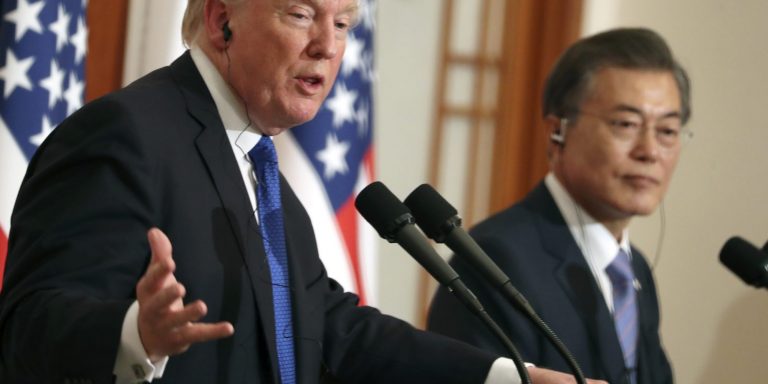INTELBRIEF
January 5, 2018
IntelBrief: A New Turn in the North Korean Crisis

- On January 4, the U.S. announced it would postpone large-scale joint military exercises with South Korea until after the Winter Olympics.
- With tensions between Washington and Pyongyang at historic highs, the postponement could further prospects for dialogue, at least between North and South Korea.
- President Donald Trump took to Twitter on January 4 to take credit for potential talks between Seoul and Pyongyang, claiming they were only possible because he had been ‘firm, strong and willing to commit our total “might” against the North.’
- On January 2, President Trump released a threatening tweet regarding North Korea’s leader and the country’s nuclear weapons program, a remarkable departure from previous U.S. presidents who publicly avoided advocating any use of nuclear weapons.
With tensions on the Korean peninsula at historic highs, some diplomatic progress has been made regarding possible talks between Seoul and Pyongyang. For the first time since February 2016, North Korea has resumed using a cross-border communication line—a small but significant move by Pyongyang towards meaningful dialogue with Seoul. For its part, South Korea is clearly concerned with lowering the threat of a war that would likely prove catastrophic for both countries.
Meanwhile, Washington has sent conflicting signals over how it views the possible resumption of talks between Seoul and Pyongyang. On January 2, U.S. Ambassador to the United Nations Nikki Haley said talks between the two Koreas wouldn’t be meaningful unless North Korea got rid of its nuclear weapons first, a demand to which North Korea has repeatedly said it will never agree. However, on January 4, President Donald Trump tweeted that talks between the two Koreas was ‘a good thing’, adding ‘Does anybody really believe that talks and dialogue would be going on between North and South Korea right now if I wasn't firm, strong and willing to commit our total 'might' against the North.”
The reference to the ‘total might’ of the U.S. appeared to be President Trump’s latest public suggestion that nuclear weapons could be in play if North Korea continued to pursue nuclear ambitions that threatened the United States. It followed North Korean leader Kim Jong-Un’s statement in his New Year’s address that his country was a nuclear power, with ICBM’s that could strike any territory controlled by the United States, including the U.S. mainland. While Kim’s claim that any U.S. target could be struck by Pyongyang is suspect, six successful tests have shown that North Korea’s nuclear weapons are for real. That statement of fact would seem to make the U.S. stance that North Korea could be stopped from having nuclear weapons problematic—if not nonsensical—in any potential negotiations.
For his part, President Trump responded to Kim’s address with a caustic January 2 tweet that salted a threat of nuclear war with a dose of off-color humor—an undiplomatic choice likely to cause concern to nations around the world. In his tweet, the President said of Kim Jong-Un, ‘Will someone from his depleted and food starved regime please inform him that I too have a Nuclear Button, but it is a much bigger & more powerful one than his, and my Button works.’
For a U.S. President to threaten the use of nuclear weapons, using casual and flippant language, is unprecedented. At most, past Presidents have hinted vaguely at the possibility of nuclear weapons use, applying the stock phrase ‘all options are on the table.’ Yet President Trump, as he stated in his January 4 tweet—which, like all his tweets, are official White House statements—clearly believes his high-profile taunting of Kim Jong-Un will ultimately lead to North Korea coming around to U.S. demands to denuclearize the Korean peninsula. President Trump’s language has sparked some reaction on Capitol Hill, where a resolution sponsored by Congressman Ted Lieu and Senator Ed Markey would limit the President’s power to order the use of nuclear weapons. However, it is unlikely Congress will take up the motion.
For tailored research and analysis, please contact: info@thesoufancenter.org
[video width="960" height="540" mp4="https://thesoufancenter.org/wp-content/uploads/2018/01/Final-Edit-1-103.mp4" poster="https://thesoufancenter.org/wp-content/uploads/2018/01/AP_17311312437337.jpg"][/video]